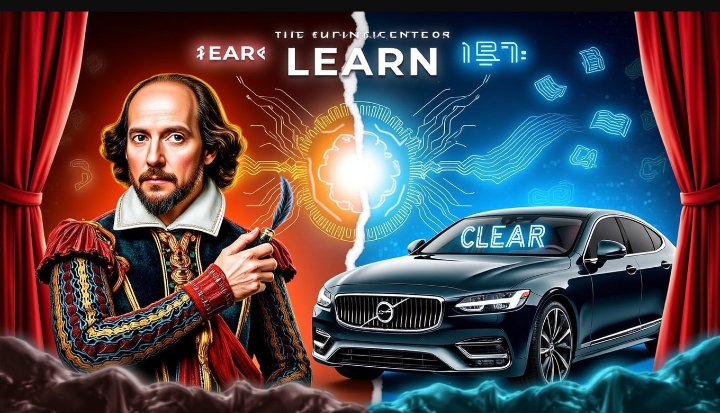That Word You Typed… What Is “Lear”?
Ever typed “lear” into Google and felt totally confused? You’re not alone! It’s one of those little words that pops up everywhere but seems to mean different things. Was it a typo? The name of a company? Something from a really old book? This little word is actually a fascinating puzzle with pieces connecting literature, big business, and our everyday desire to learn new things. Let’s solve the mystery together!
The Shakespearean King: When “Lear” Means Majesty and Tragedy
“Lear” as a Name from Long Ago
The most famous “Lear” isn’t a thing, but a who. Meet King Lear! He’s the star of a super famous, super sad play written way back around 1605 by the legendary writer, William Shakespeare. Think castles, kingdoms, and family fights that go horribly wrong.
- What’s the Play About? Basically, an aging king (Lear) decides to split his kingdom among his three daughters. But he makes them say how much they love him first. Two daughters flatter him with big, fake speeches. The youngest, Cordelia, tells the simple truth. Lear gets mad and banishes her. Big mistake! The two flattering daughters turn on him, leading to betrayal, madness, war, and ultimate tragedy. It’s heavy stuff!
- Why Does It Matter? Professor Eleanor Vance, who teaches Shakespeare at Cambridge University, explains: “King Lear asks huge questions we still wrestle with: What is true love? How should parents and children treat each other? What happens when power goes to someone’s head? It shows us the best and worst of being human.” It’s considered one of the greatest plays ever written – studied in schools worldwide for over 400 years!
- Real-Life Connection: Imagine a high school drama club putting on King Lear. Students aren’t just memorizing old words; they’re exploring jealousy, love, power, and regret – feelings everyone understands, making this ancient king feel surprisingly real today.
The Global Giant: “Lear” as a Car Parts Powerhouse
Lear Corporation: More Than Just a Name
Now, let’s jump from Shakespeare to your driveway! If you see Lear Corporation, it has nothing to do with kings. This Lear is a massive, global company – one of the world’s biggest suppliers to the car industry.
- What Do They Actually Do? Think about the inside of a car. The comfy seats you sink into? Lear probably made them. The fancy electrical systems controlling your windows, seats, and even safety features? Yep, that’s often Lear too! They are experts in making car interiors and electrical systems smarter and more comfortable.
- How Big Are They? Huge! Headquartered near Detroit, Michigan (USA), Lear employs over 165,000 people in Lear Corporation locations spread across almost 40 countries. You’ll find their factories in places like Lear Corporation Slovakia, Lear China, and many others. If you drive a car, chances are high Lear had a hand in building it.
- Real-Life Impact: Sarah Chen, an automotive industry analyst, says: “Lear isn’t just building parts; they’re shaping the experience inside modern vehicles. From sustainable materials in seats to complex wiring for self-driving features, their work touches millions of drivers daily.” Next time you adjust your seat or plug in your phone, remember companies like Lear make that seamless experience possible. (Need to contact them? Searching for the Lear HR contact number for a specific location is your best bet).
The Learning Leap: When “Lear” is a Step Towards Knowledge
The “Learn” Mix-Up: A Very Common Typo!
Okay, let’s be honest. A lot of people typing “lear” actually meant “learn“! It’s an easy keyboard slip (‘n’ is right next to ‘r’). This simple typo opens a door to something amazing: the human desire to learn and grow!
- What People Really Want to Learn: Those searches like “learn arabic“, “learn english“, “learn more“, or “learning go” (probably meaning the Go programming language) show a world hungry for knowledge. People want new languages, job skills, hobbies, and deeper understanding. Studies show over 70% of adults are actively learning something new outside of formal work or school!
- How Technology Helps: Learning Experience Platforms (LXPs). This is where things get cool. Forget boring old training videos. An LXP (Learning Experience Platform) is like a super-smart, personalized learning hub. Imagine Netflix, but for learning! Platforms like LearnVern (a popular online learning site in India) use this idea, offering courses in tech, business, and more, tailored to what you need and how you learn best. They use videos, quizzes, projects, and community features to make learning engaging.
- Real-World Learning: Think about someone in Saudi Arabia needing certification from the SCFHS (Saudi Commission for Health Specialties). They might search for “SCFHS learning links” or courses to prepare. Or a teenager using an app like Duolingo for a few minutes daily to “learn english”. These are everyday examples of the powerful “learning experience” happening globally, often sparked by a simple search.
Is “Lear” a Real Word? Dictionary Check!
Let’s settle those “People Also Ask” questions definitively:
- “What does Lear mean?” As a proper noun: Primarily Shakespeare’s King, or the corporation. It’s not a common everyday word like “cat” or “run”.
- “What is the use of Lear?” The name “Lear” itself doesn’t have a ‘use’. Its importance comes from the famous play or the global corporation bearing the name.
- “Is Lear a word in Scrabble?” Yes! “Lear” is a valid Scrabble word, referring to the Shakespearean character or, more broadly, a learning or teaching (though this meaning is very old-fashioned and rarely used).
- “Is Lear a word in the Oxford Dictionary?” Yes, the Oxford English Dictionary includes “Lear” as a proper noun (the king) and acknowledges its rare, archaic use meaning “lesson” or “learning”.
Connecting the Dots: Why This Little Word Matters
So, why did we go on this journey about “lear“? It shows how language and our searches connect vastly different worlds:
- Culture & History: “Lear” instantly reminds us of Shakespeare’s timeless story about human nature.
- Industry & Innovation: “Lear” represents the massive, unseen engineering that makes our modern cars comfortable and safe.
- Growth & Curiosity: The “learn” typo reveals our universal drive to acquire new skills – from languages (“learn arabic“) to tech (“learning go“) – powered by modern tools like LXPs and platforms like LearnVern.
Wrapping Up: From Kings to Keyboards
The mystery of “lear” is solved! It’s a word wearing multiple hats: a tragic king from centuries past, the name behind the scenes in millions of cars, and very often, a simple misstep on the keyboard leading us towards the incredible world of learning.
Whether you’re studying Shakespeare’s King Lear, researching the Lear Corporation Slovakia plant, or finally finding the right link to “learn english“, this little word highlights our connection to stories, technology, and the never-ending journey of gaining knowledge. The next time you see “lear,” you’ll know there’s probably a much bigger story behind it!
What about YOU? Did you come searching for “lear” meaning the King, the company, or was it a happy accident leading you towards learning something new? Share your “lear” story in the comments below! We’d love to hear what brought you here and what you’re hoping to learn!



